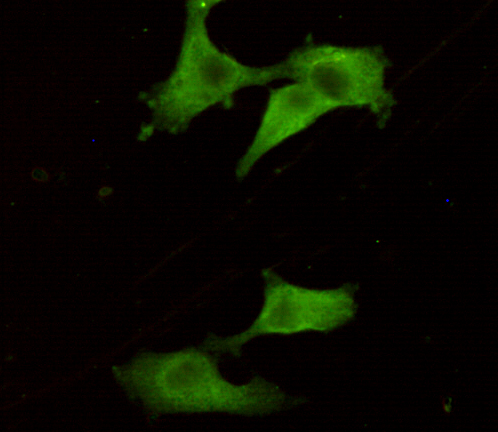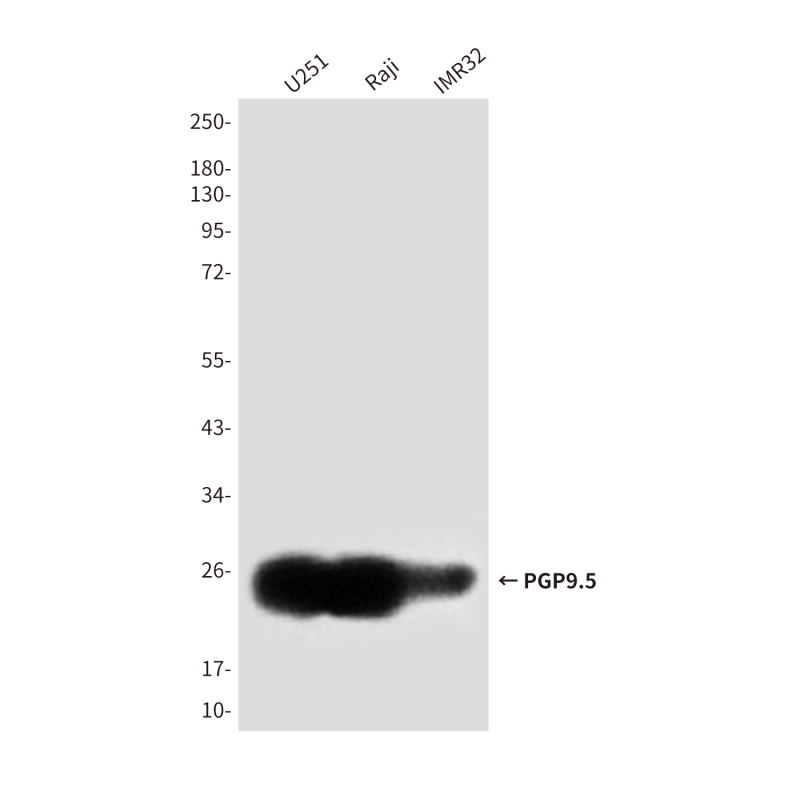

| WB | 咨询技术 | Human,Mouse,Rat |
| IF | 咨询技术 | Human,Mouse,Rat |
| IHC | 咨询技术 | Human,Mouse,Rat |
| ICC | 1/50-1/200 | Human,Mouse,Rat |
| FCM | 咨询技术 | Human,Mouse,Rat |
| Elisa | 咨询技术 | Human,Mouse,Rat |
| Aliases | UCHL1 / PGP9.5; UCHL1; B220; CD 45; CD45; cd45 antigen; ec3.1.3.48; GP 180; GP180; Human homolog of severe combined immunodeficiency due to PTPRC deficiency; L CA; L-CA; lca; Leukocyte common antigen; LY 5; LY5; Protein tyrosine phosphatase receptor type C; Protein tyrosine phosphatase receptor type c polypeptide; PTPRC; PTPRC_HUMAN; Receptor-type tyrosine-protein phosphatase C; SCID due to PTPRC deficiency; t200; T200 glycoprotein; T200 leukocyte common antigen. |
| Entrez GeneID | 7345 |
| clone | 7G7 |
| WB Predicted band size | Calculated MW: 25 kDa; Observed MW: 25 kDa |
| Host/Isotype | Mouse IgG2b |
| Antibody Type | Primary antibody |
| Storage | Store at 4°C short term. Aliquot and store at -20°C long term. Avoid freeze/thaw cycles. |
| Species Reactivity | Human |
| Immunogen | Purified recombinant human UCHL1 / PGP9.5 protein fragments expressed in E.coli. |
| Formulation | Purified antibody in PBS with 0.05% sodium azide,0.5%BSA and 50% glycerol. |
+ +
以下是3篇关于PGP9.5抗体的参考文献(示例为模拟内容,实际文献需根据具体研究补充完整信息):
---
1. **文献名称**:*"PGP9.5 as a universal marker for nerve fibers in normal and pathological tissues"*
**作者**:Wilson PO, et al.
**摘要**:该研究验证了PGP9.5抗体作为泛神经标记物的高敏感性和特异性,证实其在周围神经、中枢神经系统及神经内分泌肿瘤中的广泛表达,适用于神经纤维追踪和病理诊断。
---
2. **文献名称**:*"Ubiquitin C-terminal hydrolase (PGP9.5) in Alzheimer's disease: Neurofibrillary pathology marker"*
**作者**:Lowe J, et al.
**摘要**:通过免疫组化分析,发现PGP9.5抗体可标记阿尔茨海默病患者脑组织中的神经原纤维缠结及轴突变性结构,提示其在神经退行性疾病病理机制中的潜在作用。
---
3. **文献名称**:*"PGP9.5 expression in cutaneous nerve fibers: A diagnostic tool for small fiber neuropathy"*
**作者**:Wang Z, et al.
**摘要**:研究利用PGP9.5抗体检测皮肤活检样本中的表皮内神经纤维密度,证明其在小纤维神经病变诊断中的高灵敏度和临床应用价值。
---
4. **文献名称**:*"PGP9.5 immunoreactivity in the enteric nervous system: Implications for gastrointestinal motility disorders"*
**作者**:Sang Q, et al.
**摘要**:该文献通过PGP9.5抗体标记肠神经系统神经元,揭示了其在胃肠道动力障碍(如肠易激综合征)研究中的关键作用。
---
**注意**:以上内容为示例,实际文献需通过PubMed、Google Scholar等平台检索关键词(如“PGP9.5 antibody”、“UCHL1”、“neuroendocrine marker”)获取。建议使用近年高质量研究(如Nature、J Neurosci等期刊)以增强参考价值。
The PGP9.5 antibody targets ubiquitin carboxyl-terminal hydrolase L1 (UCHL1), a protein encoded by the *UCHL1* gene, also known as Protein Gene Product 9.5. Initially identified in neuronal tissues, PGP9.5 is a member of the deubiquitinating enzyme family, playing a critical role in the ubiquitin-proteasome system by recycling ubiquitin and regulating protein degradation. Its widespread expression in neurons and neuroendocrine cells has established it as a highly specific immunohistochemical marker for neurons, nerve fibers, and neuroendocrine tumors.
Discovered in the 1980s, PGP9.5 became pivotal in neuropathology for studying neurodegenerative diseases (e.g., Alzheimer’s, Parkinson’s) and peripheral neuropathies. Beyond neurology, it is utilized in oncology to identify tumors of neural crest origin, such as neuroblastomas and carcinoids. Recent studies also link PGP9.5 to immune regulation and cancer progression, highlighting its involvement in apoptosis and cellular stress responses.
Despite its utility, PGP9.5's functional complexity—balancing ubiquitin stabilization and degradation—remains under investigation. Its antibody is widely used in research and diagnostics via techniques like immunohistochemistry and Western blot, though cross-reactivity with non-neural tissues in certain contexts requires careful interpretation. Overall, PGP9.5 remains a cornerstone in understanding neural biology and disease mechanisms.
×